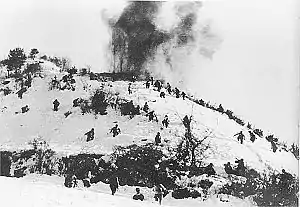1950 in China
Events in the year 1950 in the People's Republic of China.
| |||||
| Decades: |
| ||||
|---|---|---|---|---|---|
| See also: | Other events of 1950 History of China • Timeline • Years | ||||
Incumbents
- Chairman of the Communist Party of China – Mao Zedong
- Chairman of the Government – Mao Zedong
- Vice Chairmen of the Government – Zhu De Liu Shaoqi, Song Qingling, Li Jishen, Zhang Lan, Gao Gang
- Premier – Zhou Enlai
- Vice Premiers – Dong Biwu, Chen Yun, Guo Moruo, Huang Yanpei
Events

Battle of the Ch'ongch'on River: Chinese forces swarm a UN position.
- 6 January – The United Kingdom recognizes the People's Republic of China; the Republic of China severs diplomatic relations with Britain in response.
- 9 January – The Israeli government recognizes the People's Republic of China.
- 13 January – Finland forms diplomatic relations with the People's Republic of China.
- 16 January - Vietnam concluded diplomatic relations with Mainland China.
- 31 January – The last Kuomintang troops surrender in mainland China.
- 14 February – Cold War: The Soviet Union and the People's Republic of China sign a mutual defense treaty.
- 5 March - 1 May – Chinese Civil War: Landing Operation on Hainan Island – a series of battles fought in the Chinese province of Hainan between the nationalists and the communists during Chinese Civil War which resulted in the communist victory.
- 7 October – Invasion of Tibet: 40,000 troops of the People's Liberation Army invaded the Tibetan area of Chamdo. The large number of units of the PLA quickly surrounded the outnumbered Tibetan forces. By October 19, 1950, the 5,000 Tibetan troops had surrendered.[1]
- 25 November – Korean War: Forces from the People's Republic of China commenced the Second Phase Campaign. The resulting battles at Ch'ongch'on River and Chosin Reservoir expelled the United Nations forces from North Korea.
Births
- July 3 – Zhang Kangkang, Chinese writer.
Deaths
- October 27 – Ren Bishi, a leading figure in the Chinese Communist Party
- November 25 – Mao Anying, the eldest son of Mao Zedong and Yang Kaihui. Anying was killed in action by an air strike during the Korean War.
- Fang Zong'ao (Chinese: 方宗鳌; Wade–Giles: Fang Tsung-ao; 1884 – 19 February 1950) late Qing Dynasty scholar; a popular economist and jurist in the early Republic of China era, and a professor in economics and law.
See also
- 1950 in Chinese film
References
- Laird, Thomas. The Story of Tibet: Conversations with the Dalai Lama (2006) Grove Press. p. 301
This article is issued from Wikipedia. The text is licensed under Creative Commons - Attribution - Sharealike. Additional terms may apply for the media files.

